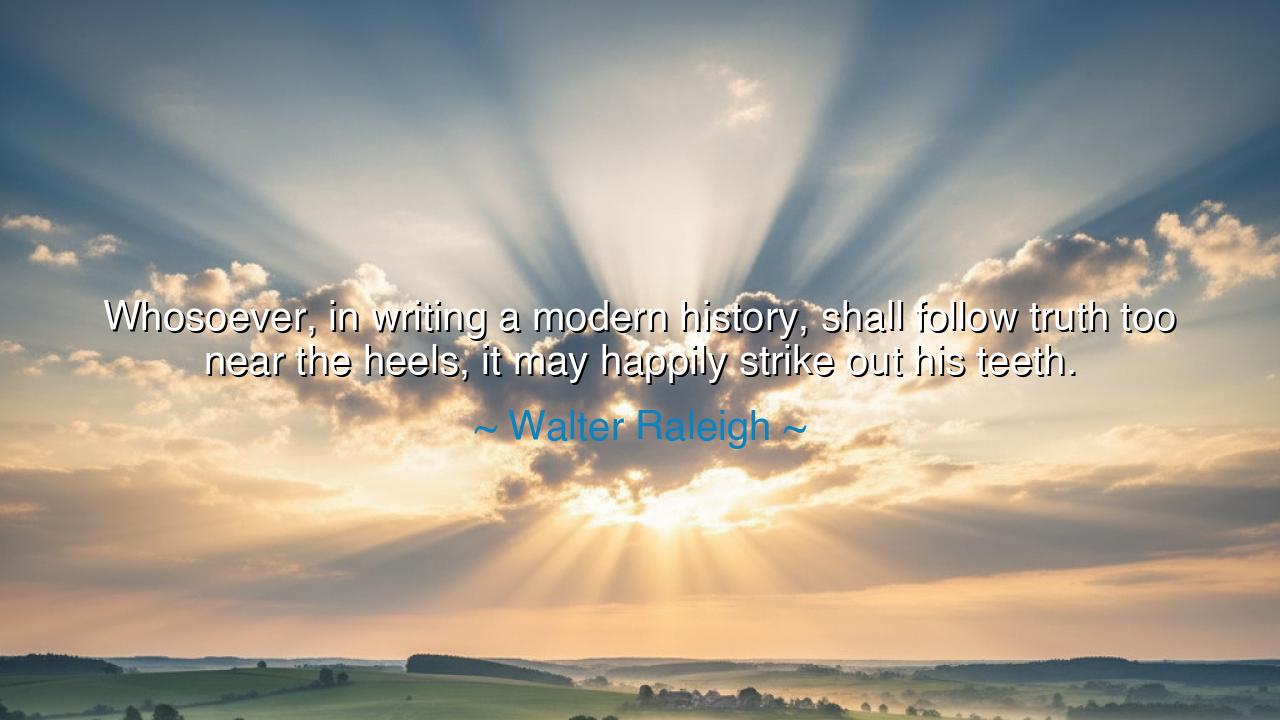
Whosoever, in writing a modern history, shall follow truth too
Whosoever, in writing a modern history, shall follow truth too near the heels, it may happily strike out his teeth.






When Sir Walter Raleigh wrote, “Whosoever, in writing a modern history, shall follow truth too near the heels, it may happily strike out his teeth,” he was not speaking merely of history, but of the perilous path of truth itself. These words, drawn from the 17th century — an age of intrigue, empire, and censorship — reveal the eternal tension between honesty and power, between the voice of conscience and the wrath of authority. Raleigh, who served under Queen Elizabeth I and later suffered under her successor King James I, knew from bitter experience that truth, when spoken too plainly, could wound not only reputations, but also the life of the speaker. His warning is a timeless one: that truth, though divine, walks with danger.
Raleigh himself was both a man of letters and of arms — explorer, courtier, poet, and prisoner. He saw empires rise and fall, and he knew the fickle heart of kings. In his later years, while imprisoned in the Tower of London, he began to write The History of the World, a vast work of philosophy and narrative meant to trace humanity’s journey through triumph and folly. But even in the quiet of his cell, he felt the heavy breath of censorship. He knew that to tell history honestly was to expose the greed, vanity, and cruelty of the powerful — and that such honesty could cost him dearly. Thus he wrote with irony and wisdom, warning that to follow truth too closely was to risk being struck by her heel, as though truth were a proud and restless horse that would not suffer to be tamed.
In this image lies deep meaning. Truth, Raleigh suggests, is not a docile servant, but a fierce and untamed creature — beautiful, necessary, and dangerous. Those who pursue her must do so with courage and care. For in every age, the telling of truth threatens the comfortable illusions upon which rulers and societies build their power. To speak what is real is to shake the foundation of deceit — and such shaking is rarely forgiven. Thus, from the courts of kings to the chambers of modern politics, those who wield honesty as a sword often find themselves exiled or silenced. Raleigh’s words, though centuries old, could still echo in the hearts of journalists, thinkers, and rebels who dare to speak against corruption today.
History offers countless witnesses to his wisdom. Think of Galileo Galilei, who, in proclaiming that the Earth revolved around the Sun, dared to follow truth “too near the heels.” For his audacity, he was tried by the Inquisition and forced to recant, though his mind remained unbowed. Or consider Socrates, who drank the hemlock for refusing to betray his pursuit of truth. Both men, like Raleigh, learned that the world loves truth in theory, but hates her in practice — for truth has a habit of making the powerful uneasy and the proud ashamed. To speak it openly is to risk one’s comfort, reputation, even life — yet to silence it is to wound one’s own soul.
And yet, Raleigh’s warning is not a call to cowardice, but to wisdom. The ancients taught that truth is a flame — and while it gives light to the seeker, it can also burn the reckless. The wise historian, the honest thinker, must know when to speak with fire and when to whisper with craft. Raleigh himself did not abandon truth; he cloaked it in poetry, allegory, and insight, allowing it to survive where blunt speech would have perished. In this, he follows the tradition of the philosophers of old — men like Plato and Tacitus, who told hard truths through art, through metaphor, through the elegance of restraint. They did not silence themselves; they learned the art of surviving their own honesty.
The lesson, then, is not that truth should be avoided, but that it must be honored with wisdom and courage. To follow truth too blindly, without regard for the world’s temper, is to court destruction. But to abandon truth altogether is to live as a shadow. The seeker must therefore learn the art of balance — to hold truth close, to speak it boldly when the time is right, and to guard it wisely when the world grows hostile. As Raleigh implies, truth is both companion and trial, both salvation and peril. The one who follows her faithfully must be ready to pay a price — for she rewards only the brave.
So let these words be a torch for all who live in times of deceit: speak truth, but speak it with wisdom; defend it, but know its weight. Let no fear silence your voice, but let no pride make you reckless. For though truth may strike your teeth if you follow her too near, she will also crown your name with honor in the ages to come. As the ancients said, “Better to fall with truth than to rise with falsehood.” And in the echo of Raleigh’s words, we hear the eternal vow of every honest soul: to walk beside truth, even if her path leads through fire.






AAdministratorAdministrator
Welcome, honored guests. Please leave a comment, we will respond soon